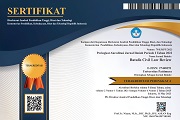Reconstruction of The Pawn Agreement Based on Justice
 ), Krisnadi Nasution(2), Rosalinda Elsina Latumahina(3)
), Krisnadi Nasution(2), Rosalinda Elsina Latumahina(3)
(1) Faculty of Law, Universitas 17 Agustus 1945 Surabaya, Surabaya, Indonesia
(2) Faculty of Law, Universitas 17 Agustus 1945 Surabaya, Surabaya, Indonesia
(3) Faculty of Law, Universitas 17 Agustus 1945 Surabaya, Surabaya, Indonesia

 Corresponding Author
Corresponding Author
Abstract
Introduction: Legally, the clauses in the pawn agreement still contain clauses that conflict with the Consumer Protection Law Nomor 8 of 1999 Article 18 paragraph (1) letter a which states that business actors who offer goods and/or services intended for trading are prohibited from making or including standard clauses in each document and/or agreement if: they state the transfer of responsibility of the business actor. In the pawn agreement there are still missing clauses that should be included in the pawn agreement.
Purposes of the Research: To analyze and find a reconstruction of the mortgage agreement based on justice.
Methods of the Research: The research method used is normative juridical. Descriptive and argumentative techniques must be used in carrying out the analysis.
Results Main Findings of the Research: Exoneration clauses are contrary to the principle of justice, therefore firm action from the authorities must be implemented without discrimination. This is done so that standard agreements made by business actors reflect the principle of justice. The purpose and objective of having a fair agreement is to get a happy ending. If an exoneration clause is found in the agreement, in this case a pawn agreement, then it is necessary to reconstruct the agreement. So that a just and civilized humanitarian agreement and social justice for all Indonesian people are realized.Keywords
DOI
10.47268/ballrev.v6i2.2873
Published
2025-07-31
How To Cite
@article{BALLREV2873,
author = {Budi Wasana and Krisnadi Nasution and Rosalinda Elsina Latumahina},
title = {Reconstruction of The Pawn Agreement Based on Justice},
journal = {Batulis Civil Law Review},
volume = {6},
number = {2},
year = {2025},
keywords = {Reconstruction; Pawn Agreement; Justice.},
abstract = {Introduction: Legally, the clauses in the pawn agreement still contain clauses that conflict with the Consumer Protection Law Nomor 8 of 1999 Article 18 paragraph (1) letter a which states that business actors who offer goods and/or services intended for trading are prohibited from making or including standard clauses in each document and/or agreement if: they state the transfer of responsibility of the business actor. In the pawn agreement there are still missing clauses that should be included in the pawn agreement.Purposes of the Research: To analyze and find a reconstruction of the mortgage agreement based on justice.Methods of the Research: The research method used is normative juridical. Descriptive and argumentative techniques must be used in carrying out the analysis.Results Main Findings of the Research: Exoneration clauses are contrary to the principle of justice, therefore firm action from the authorities must be implemented without discrimination. This is done so that standard agreements made by business actors reflect the principle of justice. The purpose and objective of having a fair agreement is to get a happy ending. If an exoneration clause is found in the agreement, in this case a pawn agreement, then it is necessary to reconstruct the agreement. So that a just and civilized humanitarian agreement and social justice for all Indonesian people are realized.},
issn = {2746-8151}, pages = {76--83} doi = {10.47268/ballrev.v6i2.2873},
url = {https://fhukum.unpatti.ac.id/jurnal/ballrev/article/view/2873}
}
Islamic Religion Al Khairat Pamekasan, Institute, Qaiyim Asy, Zitkil Muarrofah, and Iai Al Khairat Pamekasan. “NGEJHÁ Journal of Community Service Implementation Of Gold Pawn With Sharia System.” Journal of Community Service 1, no. 2 (2022): 99–104.
Airlangga, University. “Exoneration Clause in Business Contract.” Https://Repository.Unair.Ac.Id, 2024.
Anggriani, Djaman Saerika. “Application of Standard Clauses in Pawn Agreements” I, no. 1 (2013): 31–39.
Asuan, Asuan. “Settlement Against Defaulting Debtors in Pawn Agreements.” Solutions 18, no. 1 (2020): 121–38. https://doi.org/10.36546/solusi.v18i1.254.
Banten, UIN. “Theoretical Study.” Repository.Uinbanten.Ac.Id, 2024.
Dja'is, Mochammad, Etty Susilowati, Suradi Suradi, and Dessy Pintoko Nirmolo. “Electronic Goods Pawn Agreement in Central Java.” Legal Issues 48, no. 2 (2019): 186. https://doi.org/10.14710/mmh.48.2.2019.186-193.
Ideology, Pancasila Development Agency of the Republic of Indonesia. “Sukarno to Session Participants.” https://Bpip.Go.Id, 2024.
Iqbal, Muhammad, and . Sukirno. “Reconstruction of Gala Agreement (Customary Pawn) in Acehnese Customary Society Based on Sharia.” Law Reform 13, no. 1 (2017): 98. https://doi.org/10.14710/lr.v13i1.15954.
Finance, Service Authorization. Copy of Circular Letter of Financial Service Authorization Number 52/SEOJK.05/2017 Concerning the Implementation of Pawnshop Business Activities Conducting Conventional Business Activities (2017).
Grace Sharon. “Compensation in Misleading Promotion Methods Based on Law Number 8 of 1999 Concerning Consumer Protection.” Binamulia Law 7, no. 1 (2018): 50–70. https://doi.org/10.37893/jbh.v7i1.14.
Tanuwidjaja, Tan Henny. Legal Institutions of Debt Guarantee and History of Notary Legal Institutions. Bandung: Refika Aditama, 2012.
Totok Budisantoso, Sigit Triandaru and. Banks and Other Financial Institutions. Jakarta: Salemba Empat, 2000.
Umami, Yurida Zakky, and Anto Kustanto. “Legal Consequences of Default in a Pawn Agreement.” Qistie 14, no. 2 (2022): 13. https://doi.org/10.31942/jqi.v14i2.5597.| Dublin Core | PKP Metadata Items | Metadata for this Document | |
| 1. | Title | Title of document | Reconstruction of The Pawn Agreement Based on Justice |
| 2. | Creator | Author's name, affiliation, country | Budi Wasana; Faculty of Law, Universitas 17 Agustus 1945 Surabaya, Surabaya; Indonesia |
| 2. | Creator | Author's name, affiliation, country | Krisnadi Nasution; Faculty of Law, Universitas 17 Agustus 1945 Surabaya, Surabaya; Indonesia |
| 2. | Creator | Author's name, affiliation, country |
Rosalinda Elsina Latumahina; Faculty of Law, Universitas 17 Agustus 1945 Surabaya, Surabaya; Indonesia  |
| 3. | Subject | Discipline(s) | |
| 3. | Subject | Keyword(s) | Reconstruction; Pawn Agreement; Justice. |
| 4. | Description | Abstract | Introduction: Legally, the clauses in the pawn agreement still contain clauses that conflict with the Consumer Protection Law Nomor 8 of 1999 Article 18 paragraph (1) letter a which states that business actors who offer goods and/or services intended for trading are prohibited from making or including standard clauses in each document and/or agreement if: they state the transfer of responsibility of the business actor. In the pawn agreement there are still missing clauses that should be included in the pawn agreement.Purposes of the Research: To analyze and find a reconstruction of the mortgage agreement based on justice.Methods of the Research: The research method used is normative juridical. Descriptive and argumentative techniques must be used in carrying out the analysis.Results Main Findings of the Research: Exoneration clauses are contrary to the principle of justice, therefore firm action from the authorities must be implemented without discrimination. This is done so that standard agreements made by business actors reflect the principle of justice. The purpose and objective of having a fair agreement is to get a happy ending. If an exoneration clause is found in the agreement, in this case a pawn agreement, then it is necessary to reconstruct the agreement. So that a just and civilized humanitarian agreement and social justice for all Indonesian people are realized. |
| 5. | Publisher | Organizing agency, location | Faculty of Law, Universitas Pattimura |
| 6. | Contributor | Sponsor(s) | |
| 7. | Date | (YYYY-MM-DD) | 2025-07-31 |
| 8. | Type | Status & genre | Peer-reviewed Article |
| 8. | Type | Type | |
| 9. | Format | File format | |
| 10. | Identifier | Uniform Resource Identifier | https://fhukum.unpatti.ac.id/jurnal/ballrev/article/view/2873 |
| 10. | Identifier | Digital Object Identifier | 10.47268/ballrev.v6i2.2873 |
| 11. | Source | Title; vol., no. (year) | Batulis Civil Law Review; Vol 6, No 2 (2025): VOLUME 6 ISSUE 2, JULY 2025 |
| 12. | Language | English=en | en |
| 13. | Relation | Supp. Files | |
| 14. | Coverage | Geo-spatial location, chronological period, research sample (gender, age, etc.) | |
| 15. | Rights | Copyright and permissions | Copyright: Authors who publish their manuscripts in this Journal agree to the following conditions: 1. The copyright in each article belongs to the author, as well as the right to patent. 2. Authors are able to enter into separate, additional contractual arrangements for the non-exclusive distribution of the journal's published version of the work (e.g., post it to an institutional repository or publish it in a book), with an acknowledgment of its initial publication in this journal. 3. Authors are permitted and encouraged to post their work online (e.g., in institutional repositories or on their website) prior to and during the submission process, as it can lead to productive exchanges, as well as earlier and greater citation of published work. 4. Authors have the right to self-archiving of the article (Author Self-Archiving Policy)
Licence : Batulis Civil Law Review Journal is disseminated based on the Creative Commons Attribution-NonCommercial 4.0 International license terms. This license allows anyone to copy and redistribute this material in any form or format, compose, modify, and make derivatives of this material for any purpose. You cannot use this material for commercial purposes. You must specify an appropriate name, include a link to the license, and certify that any changes have been made. You can do this in a way that is appropriate, but does not imply that the licensor supports you or your use.
|
Copyright (c) 2025 Budi Wasana, Krisnadi Nasution, Rosalinda Elsina Latumahina

This work is licensed under a Creative Commons Attribution-NonCommercial 4.0 International License.

 : 579 times
: 579 times Download : 322 times
Download : 322 times














